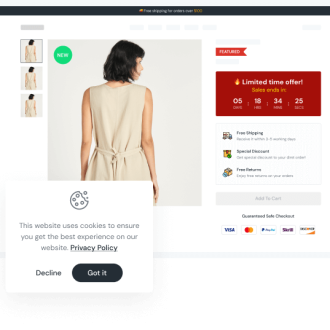Although Shopify and GoDaddy are both popular website builders, one of them may be better for you than the other, depending on your goals or business plan. If you read our blog posts on comparisons, you may make a great choice that fits both your needs and your budget.
Definition Comparison
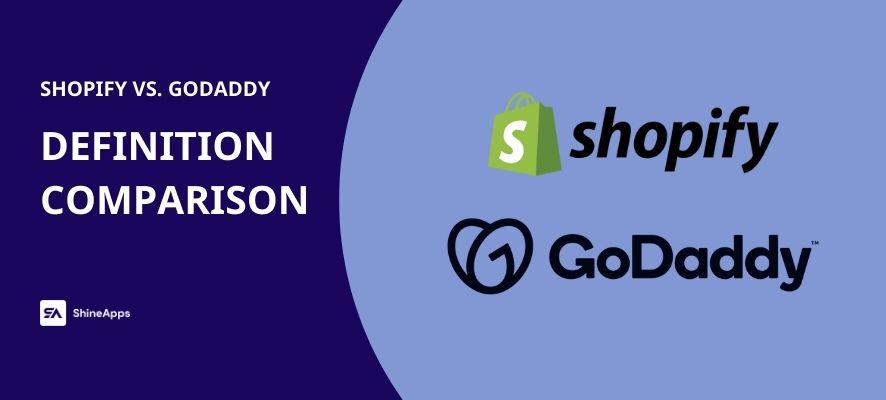
GoDaddy is a great choice for web design beginners building a professional business website. On the other hand, Shopify has more advanced ecommerce features.
GoDaddy has been one of the leaders in the field of online businesses for many years. The all-in-one website builder has a low cost, a long range of integrated marketing features, easy-to-use drag-and-drop templates, artificial intelligence (AI) design for speedy setup, and mobile-friendly optimized designs.
It additionally provides a free version, in contrast to many of its competitors. The free version is a continuous free plan rather than a free trial. Despite its limitations, the plan is perfect for business owners who only require a simple public-facing website.
When Shopify first launched in 2006, nine years later than GoDaddy, it quickly gained attention as one of the top e-commerce platforms available. Shopify has established an excellent track record as a tool for assisting businesses in setting up an effective yet simple online store.
Each subscription comes with an unlimited amount of product sales, limitless bandwidth usage, and thousands of marketing and shipping tools. Even the payment operator is built into the software. Because of Shopify’s cloud-based and hosted design, business owners have the freedom to manage their operations from any location.
Shopify and GoDaddy Comparison
Pricing And Value Comparison
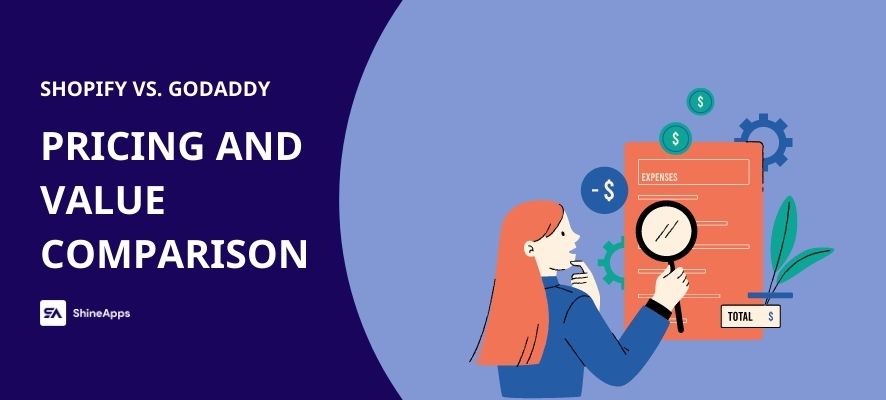
Of the two website builders, GoDaddy is the cheaper option than Shopify. If you want to create an online website without focusing on ecommerce business, GoDaddy is a good choice.
Besides, Shopify is focusing more on offering ecommerce features to build up a dropshipping business. Of course, with more additional features to help users customize their store easily, Shopify is more expensive.
Shopify | Starter | Basic | Shopify | Advanced |
$5 per month | $29 per month | $79 per month | $299 per month | |
GoDaddy | Basic | Standard | Premium | |
$9.99 per month | $10.49 per month | $14.99 per month |
By comparison, Shopify’s options all let customers sell a limitless quantity of items online. Every Shopify plan comes with marketing automation, which enables users to create unique automated processes to engage customers at every step of their purchasing journey.
Users can also filter and segment customers into hundreds of groups, and they can set up geographic market areas to ensure that customers in various geographic areas have a specific shopping experience.
On the other hand, GoDaddy offers many free themes for all plans, which means you can easily customize your online store. If you only want to create online stores in your style without many shopping features, GoDaddy is better.
Ecommerce Functionality Comparison
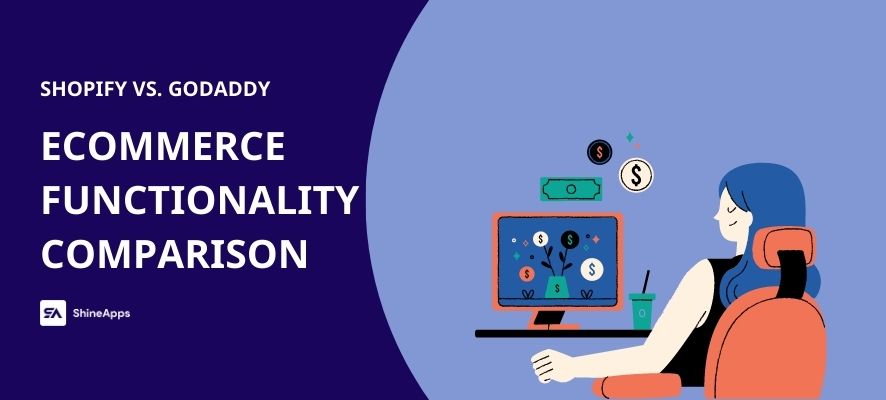
GoDaddy started as a provider of domain names and hosting services, but Shopify was created in particular to build e-commerce websites. As a result, Shopify provides more functionality and e-commerce than GoDaddy.
Both platforms offer an extensive selection of e-commerce tools that enable users to set up an online business. They both offer payment gateways to process credit cards or direct payments and come with a point-of-sale solution.
Depending on the plan, Shopify’s online credit card fees range from 2.4% plus 30 cents to 2.9% plus 30 cents USD. GoDaddy is the most inexpensive choice because it charges 2.3% plus 30 cents on all of its plans.
Shopify has partnered with 100 third-party payment gateways, making it possible to offer more payment providers than GoDaddy. About half as many payment processors are used by GoDaddy.
The ability to use coupons, provide discounts, re-engage customers via abandoned cart recovery, offer cheap shipping, and provide real-time shipping rates are further basic features of e-commerce that are offered by both of them.
With Shopify, optimizing product fulfillment is simple with one central location for managing orders. Business owners can manage, track, and deliver items across several locations through its inventory management tool.
Some Shopify plans include ABC analytics, an evaluation system that ranks products and variants based on sales performance, and a bulk inventory editor that helps edit, customize, and manage multiple products across fulfillment locations. These features enable store owners to make informed decisions about which products to stock, reorder, and take away.
For each of its e-commerce plans, GoDaddy offers an inventory tracker that refreshes your inventory whenever an order is placed. Users can link the website’s product catalog to Shopify as well as Amazon, eBay, Etsy, Walmart, Facebook, and Instagram. These websites’ orders and stock will automatically sync with the online store’s stock levels.
Shopify has better inventory management features than GoDaddy because of its ability to pull inventory from multiple fulfillment locations, advanced analytics, and fulfillment features that make it simple for users to receive inventory from suppliers and move it between warehouses and sales locations.
Customization Comparison
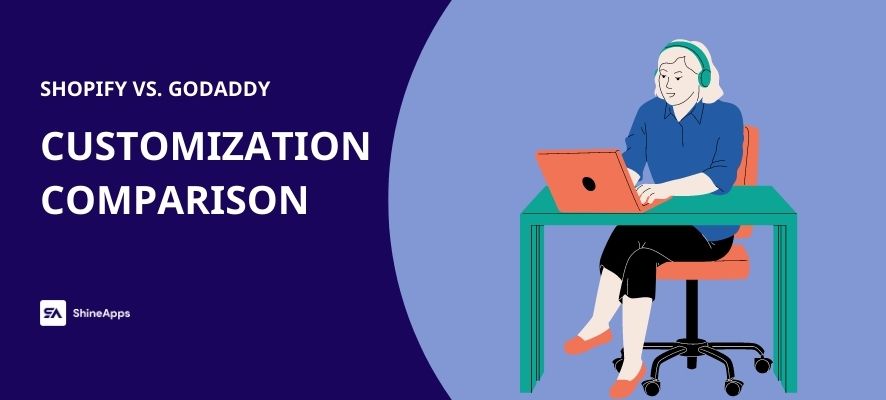
Both GoDaddy and Shopify provide customers with free and premium storefront design templates that are readily editable using a drag-and-drop editor, making it simple to customize website designs. To match the logo of your business, you can also customize particular elements like color, font, and layout.
To attract potential customers or keep and encourage existing ones, users of both platforms can customize coupon codes. Users have the option to make manual checkout coupons. Depending on the business owner’s choices, these codes may apply to some products, collections, customers, or even anyone.
Installing third-party apps is one of the main ways Shopify helps its users customise their online stores. More than 8,000 applications are available in the Shopify app store to assist users with dropshipping, marketing, product fulfillment, store design, customer conversion, and other tasks in addition to customizing every part of their website.
In contrast, GoDaddy doesn’t offer an app store. Due to the limited connection possibilities available, GoDaddy users have fewer options for further customizing their stores.
Users can build an online store from scratch using a range of options offered by both Shopify and GoDaddy. For creating a website, both platforms provide a wide selection of dynamic, mobile-responsive themes. Shopify offers more than 100 storefront styles that may be customized, with prices ranging from free to $350 for premium templates.
On the other side, GoDaddy offers about 20 movable storefront themes. The themes cover the majority of the major industries, including real estate, professional services, automotive, education, fitness, fashion, beauty, and more, even if that is far less than Shopify.
Both platforms feature a drag-and-drop editor that makes it simple for users to customize their online store. Users can build their websites using these simple features even if they have no experience with coding.
Although it’s simple to customize pre-existing designs on both platforms, GoDaddy provides an AI-powered function that will create a website for you. GoDaddy’s Artificial Design Intelligence will develop an initial site design once you handle a few inquiries about your business, which you can then further customize.
Marketing And SEO Comparison
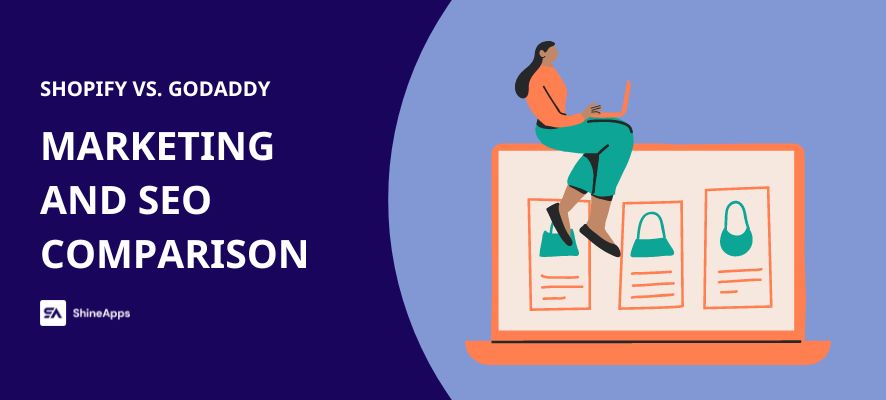
Shopify offers consumers a plethora of easy-to-use marketing tools to support online stores in bringing in, converting, and keeping repeat customers. Customers will be able to find your store in search engines with the help of SEO features like title tags, meta descriptions, product details, and blogging options.
The e-commerce platform also features Facebook Ads, Google Smart Shopping, email marketing, and campaign design. Every package includes integrated custom automation that lets you engage with customers at every stage of their journey.
Additionally, GoDaddy offers a wide range of SEO and marketing features. Store owners can start Google paid search ads, generate shoppable social posts, send abandoned cart emails, and send emails using custom templates from GoDaddy Studio directly from their GoDaddy dashboard.
While both platforms offer plenty of great SEO and marketing tools that can help small businesses market themselves in the competitive online market of today, GoDaddy’s Studio gives it the edge over Shopify. Users can create professional-looking content for their social media platforms by using the free GoDaddy Studio app.
For creating branded content for each social media connection and website, you may pick from a huge selection of templates that are easily editable. Additionally, the app offers a quick video editor that will enable you to make videos for your business and increase social engagement on websites like Instagram and TikTok.
Which Platforms Should You Choose?

After the comparison between the two platforms, let’s find the answer to the question: who should use Shopify and GoDaddy?
GoDaddy is best suited for very small businesses that don’t depend fully on their web store to earn revenue because of its limited e-commerce services. It is the top-ranked option in our comparison of the best free website builders because it is by far the least costly choice, making it perfect for startup businesses that want to test out their company idea before committing to a significant monthly cost.
How’s Shopify? It’s the most suitable for anyone who wants to develop an advanced store or who requires inventory management features if their online store serves as their main source of revenue. Shopify made our list of the top e-commerce platforms because of its rich retail features.
In Conclusion
Without any coding skills, users of both platforms may build online stores to appear professional. They both provide a full range of features that enable customers to start, develop, and run a successful online business.
Based on your personal opinion, strategy, budget, and purpose, you will be the one who decides which ecommerce platform is better. Through this blog post, you can choose one suitable platform for your business.



